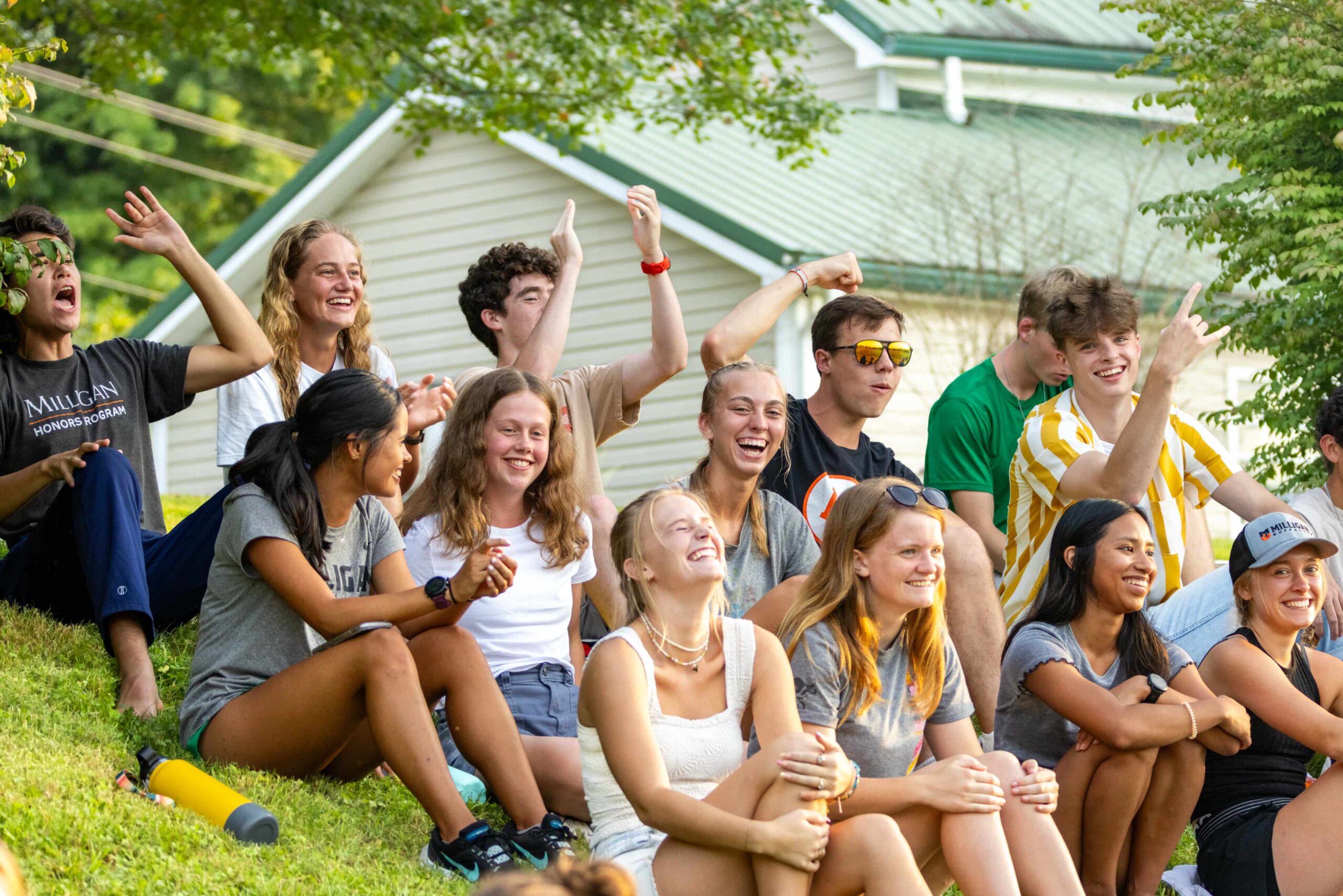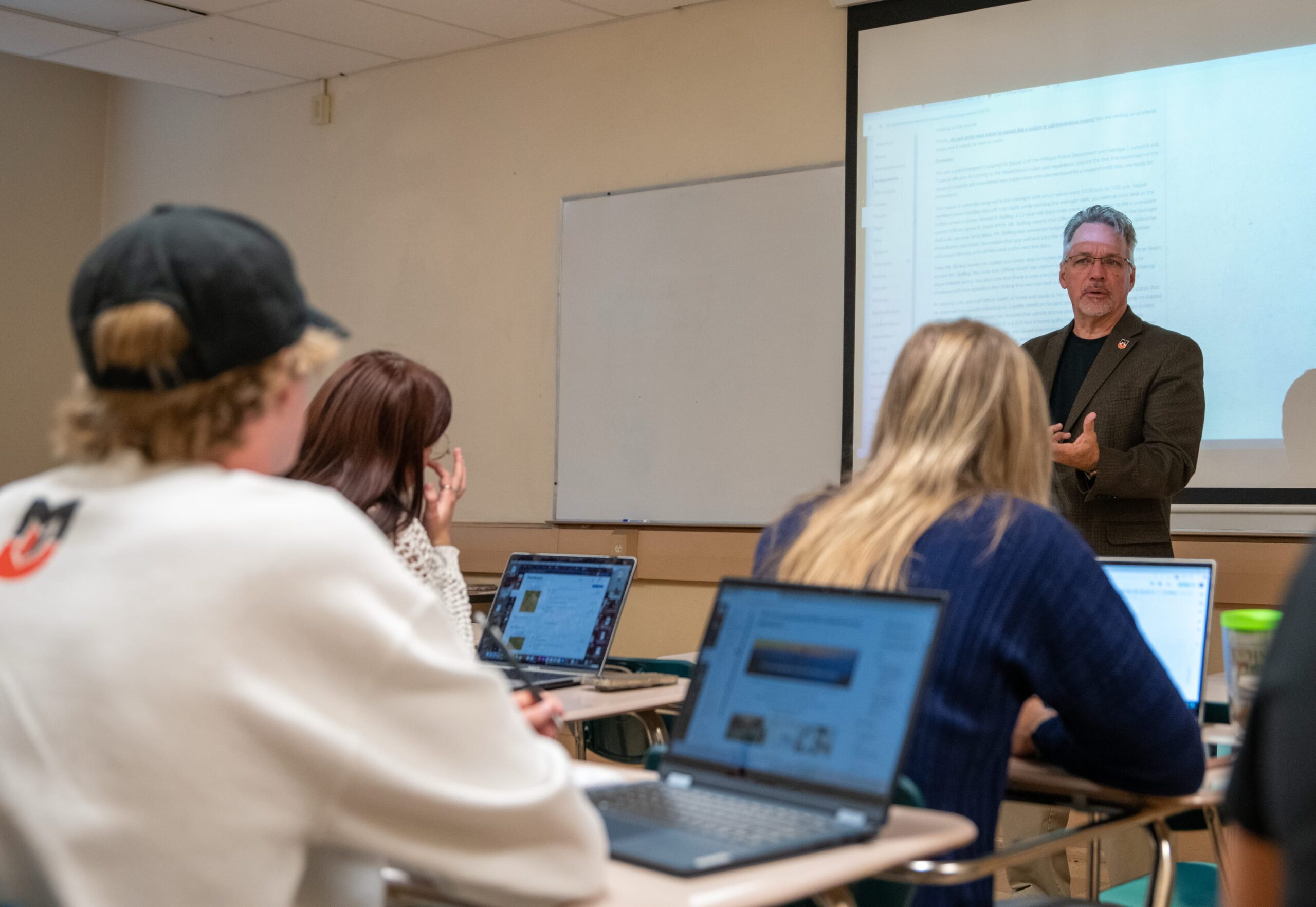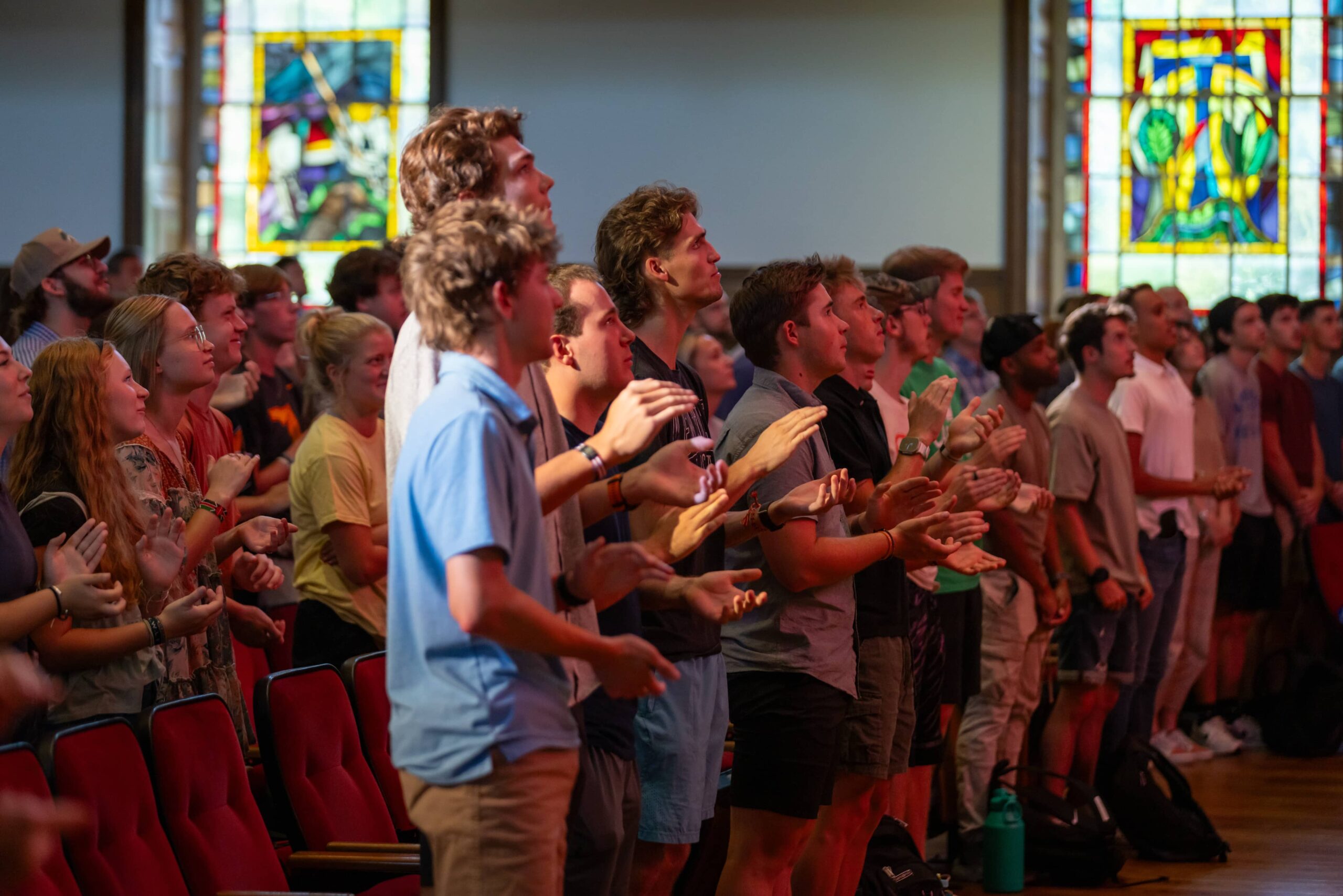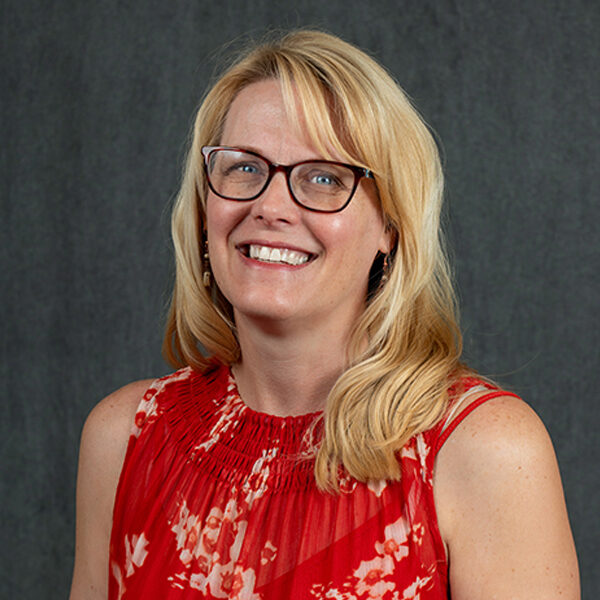Student Benefits
Students who participate can expect academic and cognitive gains as well as enhanced career development and preparation for graduate school.
Student Benefits
Students who enroll in mentored research courses can pursue additional research activities and be recognized as research scholars at graduation.
Faculty Benefits
Faculty-mentors reap intrinsic benefits.
Faculty Benefits
Finding personal and professional satisfaction in modeling life-long learning through relationships with students—and they benefit from the professional development that can come from such activities.
Institutional Benefits
Institutions benefit from the activities and excitement that come to a campus when faculty and students collaborate on research.
Institutional Benefits
Institutions benefit from the activities and excitement that come to a campus when faculty and students collaborate on research.
How It Works
Value. Examine. Create. Share.
RISE Above is designed to move traditional undergraduate students progressively through four major outcomes. In the freshman and sophomore years, building on courses already in place, RISE Above will focus on strengthening connections between knowledge and skill and promoting the inherent value of participating in research. In the junior and senior years, students will be invited to work on independent research projects, mentored by Milligan professors, and present their findings in a public forum.
Helpful Links
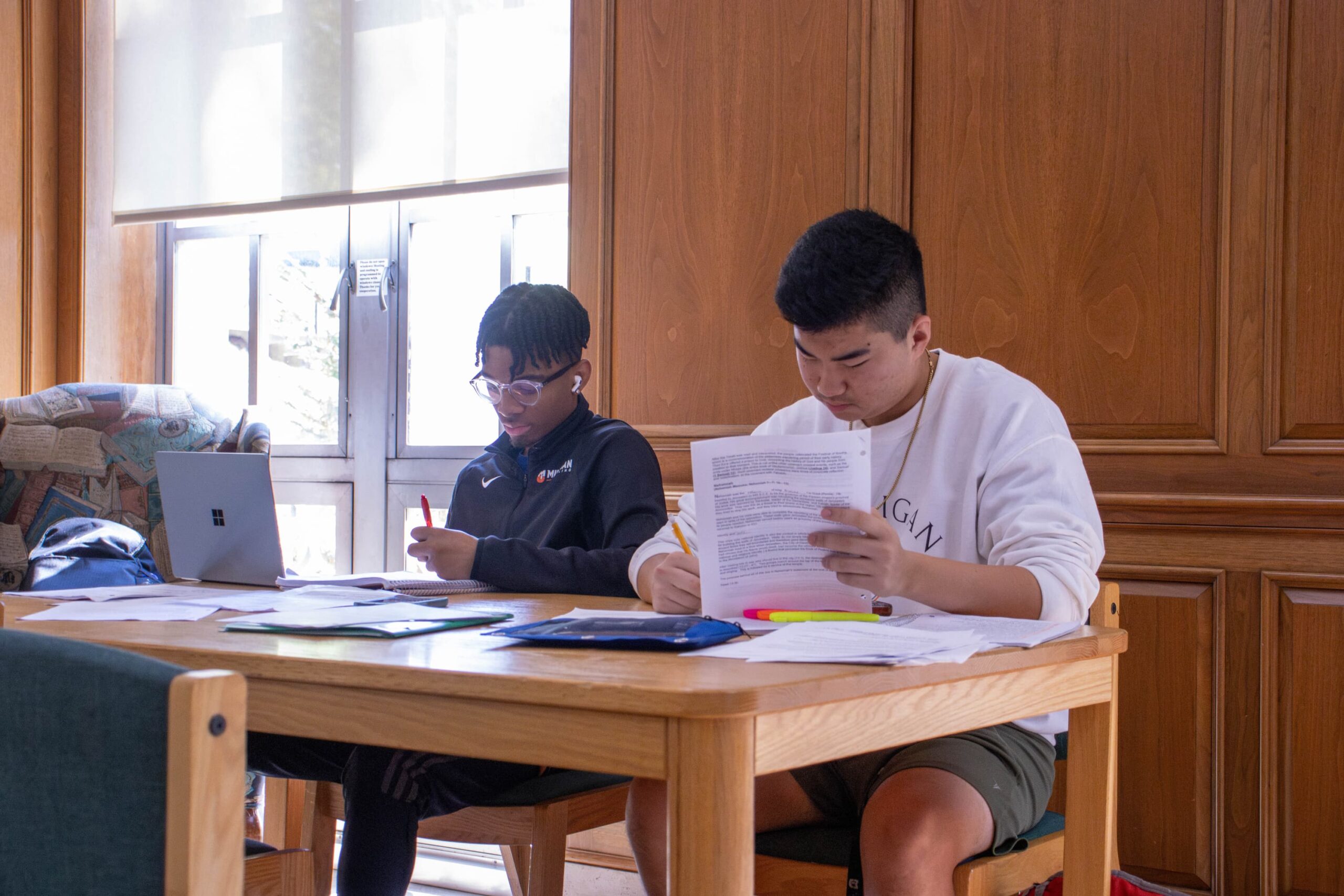
Mentored Research
In recognition of the many benefits of undergraduate research, the University implemented the Rise Above program in 2012 to significantly increase the number of students who participate in undergraduate research.
Students seeking to pursue undergraduate research for credit will identify a faculty mentor who will support and facilitate the research initiative, including the completion of one or more courses in which research is the focus. These “RISE” courses are available across the University’s academic offerings. “Rise” courses are available in all academic disciplines. Courses are numbered 499A, 499B, and 499C.
This faculty-mentored set of independent research courses will allow for an in-depth study of a specific question relevant to the discipline. At the successful conclusion of three credit-hours (499A, B, and C), students will have submitted a substantive paper with bibliography and will have publicly presented their findings.
499 Courses
Students enrolled in 499A are considered to be in the “formative” stage of their research project. Students should enroll in 499A if they are in the early stages of forming their project ideas and when considerable work still needs to be done before new knowledge or creative works can be started.
Depending on the discipline, students may do any of the following kinds of activities:
- find and read relevant literature
- develop an annotated bibliography
- identify key methods, theories, or models to guide the project
- develop foundational research skills
- attend research planning meetings
- write a research proposal
- shadow or assist more advanced researchers, etc.
Students enrolled in 499B are considered to be in the “productive” stage of their research project. Students should enroll in 499B if their project idea is well-formed and the student has the necessary background information and skills to begin the hard work of carrying out their planned project.
Depending on the discipline, students may do any of the following kinds of activities:
- collect data
- write
- create
- initiate contacts with participants/agencies
- get IRB approval
- organize the data
- establish reliability and validity of methods, etc.
Students enrolled in 499C are considered to be in the “culminating” stage of their research project. Students should enroll in 499C if their project is largely done and ready for final presentation.
Depending on the discipline, students may do any of the following kinds of activities:
- analyze data
- write conclusions
- finalize project/paper
- submit for conference
- prepare presentation
- attend and present at a conference
- submit for publication, etc.
Regardless of the discipline, students enrolled in 499C are expected to have a written paper with bibliography either as their final product or as an accompanying description of their project. Students in 499C are also required to make their project public through a presentation at an appropriate public venue.
This may be accomplished in any of the following ways: giving an oral or poster presentation at a conference, giving a gallery talk, or putting on a performance. Students are encouraged to present at Milligan’s annual RISE Above Research Conference to meet this requirement.
Research Conferences
RISE ABOVE UNDERGRADUATE RESEARCH FORUM
Milligan University
April 10, 2025 (Abstracts due March 10, 2025)
In this year’s CFP, writers should consider roots and branches as that theme applies to their own fields of study, whether literal or symbolic. Writers might choose a literal interpretation of roots and branches, like a biology major researching Pando, the world’s largest living organism: a collection of quaking Aspens growing from a single root system in Utah. Here, the student begins with a literal root system and then decides which branches in that ecosystem are worth pursuing more deeply. For instance, the student might study how the rise of male mule deer could threaten this ecosystem. Writers might also choose a metaphorical approach, like a church history major researching Independent Catholic Church. Here, the student might imagine the Roman Catholic Church as the “root” and the Independent Catholic Church as a “branch.”
More information about registering can be found on the Blue Ridge Undergraduate Research Conference page.
SCHOLARS TRANSFORMING THROUGH RESEARCH (STR): COUNCIL ON UNDERGRADUATE RESEARCH’S ADVOCACY PROGRAM
Submissions for the 2024-25 Program close on Friday, September 20, 2024.
The STR Program was developed to broaden participation, allowing students at varied stages of the undergraduate research process to engage. Participants will learn valuable skills in communicating the impact of their undergraduate research, scholarship, and creative inquiry experience to a variety of audience members and stakeholders.
The National Conference on Undergraduate Research (NCUR) 2024
The National Conference on Undergraduate Research (NCUR) is dedicated to promoting undergraduate research, scholarship and creative activity in all fields of study by sponsoring an annual conference for students. Unlike meetings of academic professional organizations, this gathering of student scholars welcomes presenters from all institutions of higher learning and from all disciplines. Overall, this conference offers a unique environment for the celebration and promotion of undergraduate student achievement; provides models of exemplary research, scholarship, and creative activity; and offers student career readiness development.
STONE CAMPBELL JOURNAL CONFERENCE
Spring Conference
The Stone-Campbell Journal is designed for students, scholars, and ministers of the Stone-Campbell Restoration Movement who think deeply about the Bible, theology, and issues related to our common heritage.
The 47th Appalachian Studies Association Conference
March 20-22, 2025
As the 48th Annual Appalachian Studies Association Conference approaches, Tennessee Tech University would like to welcome submissions! The 2025 Program Committee invites proposals for panels, papers, posters, roundtables, performances, or workshops. The full call for participation with details for online submission is now available.
Annual Appalachian Research Symposium
The Symposium is open to all undergraduate and graduate students of all disciplines from all colleges and universities doing work pertaining to Appalachia. Registration is free for both presenters and registered attendees. The Symposium is intended to foster a supportive community in which students from various fields can present their Appalachian-based research and creative work. This year’s Symposium will provide an opportunity for students to network, collaborate, learn from each others’ findings, and explore issues relevant to Appalachian communities. Students creating performance or visual artworks related to Appalachia are strongly encouraged to participate.
Abstract Submission: To be considered for inclusion in the Symposium, students should submit a 200-250 word abstract (a brief summary/overview of your work) online by 5 pm ET on February 7, 2025. Notice of submission acceptance will be emailed. To submit an abstract, please use this form: 2024 Abstract Submission Form.
Symposium Registration: Registration for attendance is online and due by 5 pm ET on Friday, February 16th, 2024. All presenters must also register as attendees. Registration will ensure seating and refreshments. To register: 2024 Registration Form (for both presenters and non-presenting attendees).
ETSU APPALACHIAN STUDENT RESEARCH FORUM
Spring Conference
The ETSU Appalachian Student Research Forum is an annual event in which undergraduate, graduate and medical students as well as post-doctoral fellows and medical residents present their research in a formal setting. The Forum is open to all colleges and universities within the Appalachian region. Participation is free!
Blue Ridge Undergraduate Research Conference
April 10, 2025
Undergraduate students from institutions throughout the Southern Appalachian region will be chosen to present their research projects in a comfortable setting surrounded by other researchers and faculty. This year’s conference will be a one-day event, with sessions starting mid-morning. There will also be a poster session and a reception for all participants and faculty. The conference will take place at Milligan University.
Undergraduate Research Week (URW)
April 21-25, 2025
Celebrate with us all week long. Take a look at what will be happening here at CUR and at other institutions. Follow along on social media using #URW2025.
Gratitude Posts: What impact has undergraduate research had on you? Is there a mentor you would like to thank? Is there a research project that made you think twice about something? Is your faculty’s hard work making your undergraduate research programs successful? Make sure to thank those who have made a difference in your undergraduate research journey by tagging #URW2025 on social and making sure to tag @CURinAction so we can share your stories.
Celebrate Success: Throughout the week, CUR will be posting undergraduate research highlight stories from many membered institutions and award winning community members. Make sure to read these amazing stories!
Share What’s Happening On Your Campus: Take a minute and share upcoming celebrations, symposia, and more that may be happening on your campus during or after Undergraduate Research Week.
Additional conferences can be found at the Council on Undergraduate Research.

